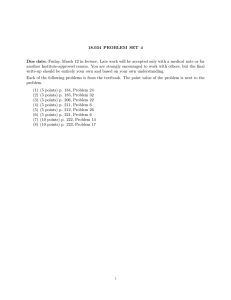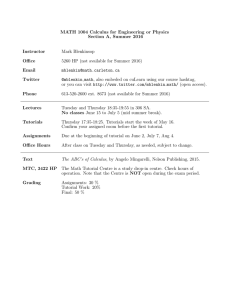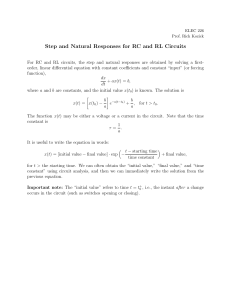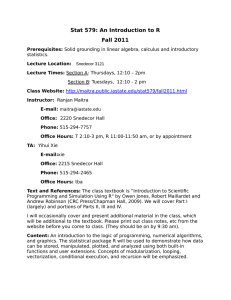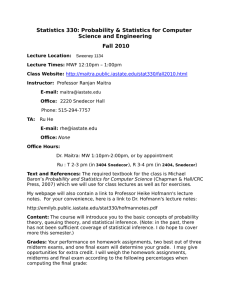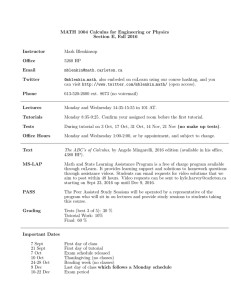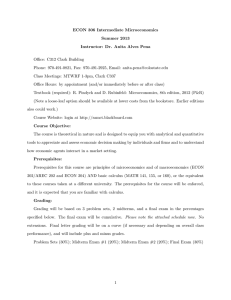F - Carleton University
advertisement
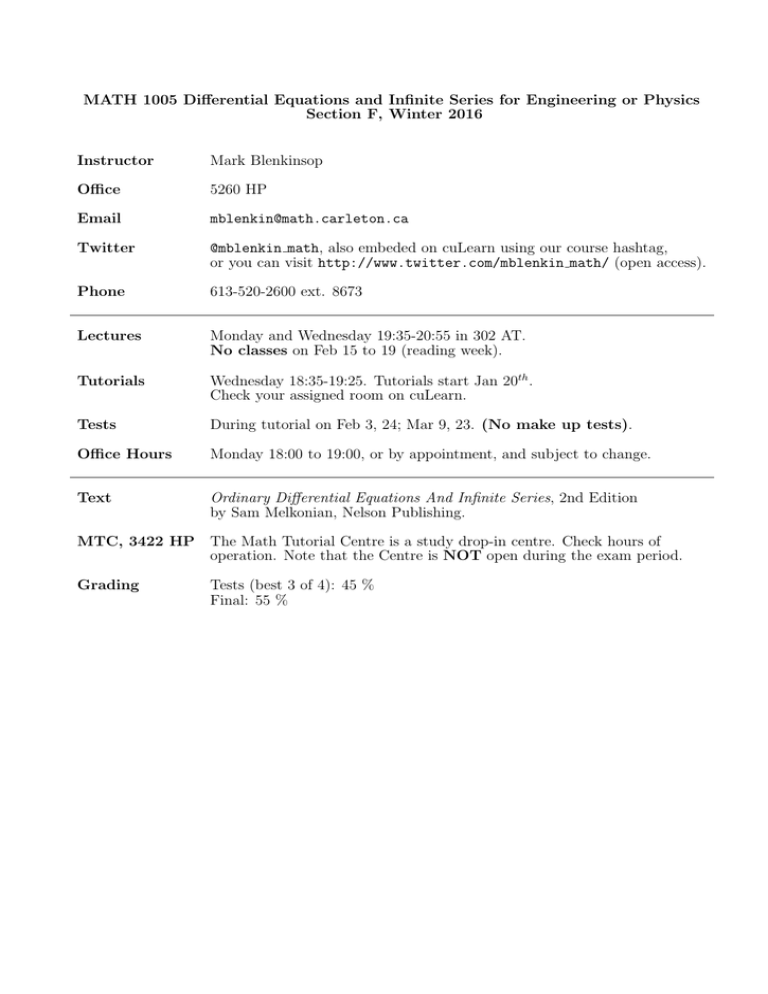
MATH 1005 Differential Equations and Infinite Series for Engineering or Physics Section F, Winter 2016 Instructor Mark Blenkinsop Office 5260 HP Email mblenkin@math.carleton.ca Twitter @mblenkin math, also embeded on cuLearn using our course hashtag, or you can visit http://www.twitter.com/mblenkin math/ (open access). Phone 613-520-2600 ext. 8673 Lectures Monday and Wednesday 19:35-20:55 in 302 AT. No classes on Feb 15 to 19 (reading week). Tutorials Wednesday 18:35-19:25. Tutorials start Jan 20𝑡ℎ . Check your assigned room on cuLearn. Tests During tutorial on Feb 3, 24; Mar 9, 23. (No make up tests). Office Hours Monday 18:00 to 19:00, or by appointment, and subject to change. Text Ordinary Differential Equations And Infinite Series, 2nd Edition by Sam Melkonian, Nelson Publishing. MTC, 3422 HP The Math Tutorial Centre is a study drop-in centre. Check hours of operation. Note that the Centre is NOT open during the exam period. Grading Tests (best 3 of 4): 45 % Final: 55 % Evaluation ∙ A 3-hour final examination will be held during the April exam period, (11𝑡ℎ − 23𝑟𝑑 ) covering the entire course. Date and time is TBD, so DO NOT schedule flights or other departures during the exam period! Students wishing to view their exams (marks will not be changed) must make a request to The School of Mathematics and Statistics within the 3 weeks following the official release of grades. ∙ All uncollected test and tutorial papers will be destroyed after the final exam. Any issues with test or tutorial grades must be addressed before the final exam. Students who have less than 30% for their term grade and miss the final will be given a grade of FND (fail, no deferral). ∙ Tests will be held during tutorials on the above specified dates. Only the best 3 tests will be counted, and no make up tests will be offered. No explanation is needed for a missed test, but you are strongly advised to write every test in order to properly prepare yourself for the final exam. ∙ Calculators are permitted for this course. Non-programmable non-graphing calculators are allowed on tests and the exam. ∙ Tutorials are compulsory. TA’s will provide interactive practice problems which everyone needs to attempt to solve. You are encouraged to work in groups, and only one solution paper needs to be handed in with all members’ names listed. Conduct and Content Policies ∙ Incidents of cheating will be dealt with in a formal fashion. All suspected incidents and supporting documentation will be forwarded to The Office of The Dean of Science. ∙ Classroom teaching and learning activities, including lectures, tutorials, etc., and all associated course materials, including any handouts and/or online content are copy protected and remain the intellectual property of their respective author(s). Students registered in the course may take notes and make copies of course materials for their own educational use only. Students are not permitted to reproduce or distribute lecture notes and course materials publicly for commercial or non-commercial purposes without express written consent from the copyright holder(s). ∙ This course uses cuLearn. Additional content will be posted and announced to all students. In particular, supplementary content related to course material is testable. ∙ Communication via email is a formal route of communication, and should have a reasonable expectation of response in 4-7 days. Any lack of response beyond 7 days can be followed up on. Alternatively, informal and non-sensitive communication can also be conducted via Twitter, with a general expectation of a much quicker response. DO NOT use Twitter to solicit a faster email response. Accommodation Policies ∙ Students with disabilities requiring academic accommodations in this course must register with the Paul Menton Centre for Students with Disabilities (PMC) for a formal evaluation of disability-related needs. Registered PMC students are required to contact the PMC every term to have a Letter of Accommodation sent to the Instructor by their Coordinator. In addition, students are expected to confirm their need for accommodation with the Instructor before the first in-class test/midterm. If you require accommodations only for formally scheduled exam(s) in this course, you must request accommodations by the last official day to withdraw from classes. ∙ Accommodations for other reasons such as religious obligation, or parental leave, will be done only in accordance with University policy. These policies are administered by the office of Equity Services.
